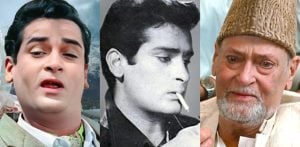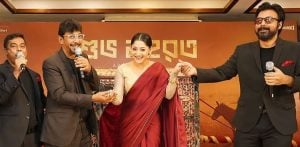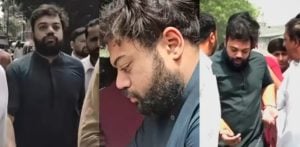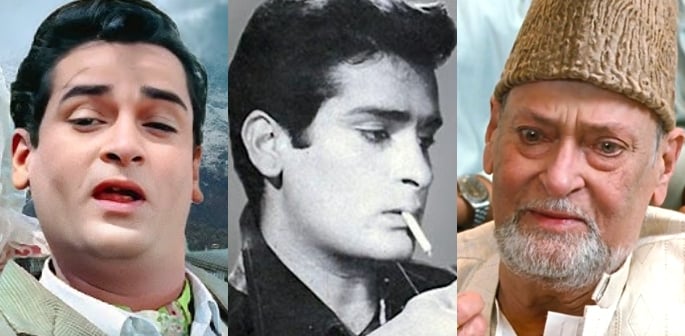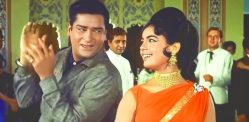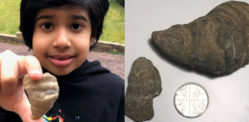"Shammi Ji is a symbol of youth."
In the realm of the glorious yesteryears of Indian cinema, Shammi Kapoor remains a star like no other.
He is a true representation of energy, dance, flamboyance, and enigma onscreen.
In his illustrious career that spanned over five decades, Shammi Sahab left the audience feeling positive, amazed, and gleeful.
He was born Shamsher Raj Kapoor on October 21, 1931, to the iconic actor Prithviraj Kapoor and Ramsarni Kapoor.
Shammi Sahab’s older brother, Raj Kapoor, was touted as the showman of Indian cinema, while his younger brother, Shashi Kapoor, was also destined for stardom.
In this glistening lineage of heroes, Shammi Sahab stood out as the ultimate heartthrob – a charismatic actor that many loved to admire and emulate.
While Shammi Sahab was one of the most bankable and popular stars of the 1960s, his successful transition to character roles from the 1970s proves his versatility.
In a tribute to this legend, we proudly present 15 films of Shammi Kapoor that never get old.
Tumsa Nahin Dekha (1957)
 Director: Nasir Hussain
Director: Nasir Hussain
Stars: Shammi Kapoor, Ameeta, Pran, BM Vyas
This film, filled with fun and frolic, did wonders not only for Shammi Sahab but also for the veteran filmmaker Nasir Hussain.
Tumsa Nahin Dekha marked Nasir Sahab’s directorial debut.
While Shammi Sahab had made his acting debut with Jeevan Jyoti (1953), he was delivering consecutive flops up to this point.
He was also often seen in a second lead position to heroines, including Suraiya, Madhubala, and Meena Kumari.
That all changed with Tumsa Nahin Dekha, which introduced the audience to Shammi Sahab’s energetic and infectious persona.
The film also emboldened the evergreen actor-singer combination Shammi shared with Mohammad Rafi.
Later reflecting on this partnership, Shammi Sahab says: “I don’t think anyone could have done for me what Rafi Sahab did for me.
“He would know exactly what to do as I told him.”
In Tumsa Nahin Dekha, Shammi Sahab plays the effervescent Shankar Bhat, who must win the heart of Meena (Ameeta).
Shammi Sahab gives his all to the film, which is evident in the massive success and hysteria that the actor earned from it.
Above all, Tumsa Nahin Dekha proved one thing: This actor was here to stay.
Junglee (1961)
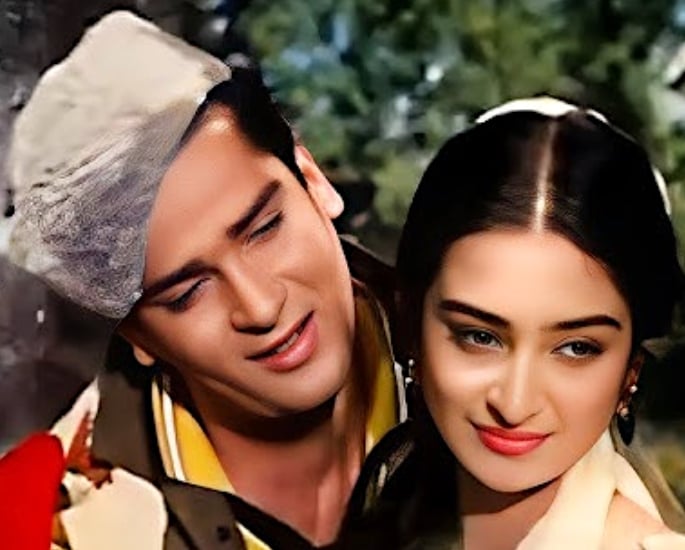 Director: Subodh Mukherjee
Director: Subodh Mukherjee
Stars: Shammi Kapoor, Saira Banu, Shashikala, Anoop Kumar, Lalita Pawar
Shammi Kapoor is often called the ‘Yahoo’ star. This identity was carved from Subodh Mukherjee’s Junglee.
Marking the debut of Saira Banu, the film narrates the saga of the pompous businessman, Shekhar, played by Shammi Sahab.
While in Kashmir, Shekhar falls in love with the beautiful Rajkumari (Saira).
When he is trapped in a snowstorm with Rajkumari, Shekhar understands the meaning of living fully and in a carefree way.
His newly-found optimism is underlined in Mohammad Rafi’s classic chartbuster, ‘Chaahe Koi Mujhe Junglee Kahe‘.
Performed exuberantly by Shammi Sahab, the number illustrates the actor’s inherent charm and energy.
Junglee became the highest-grossing film of the year and started a wonderful career for Saira.
In a review of the film, Dustedoff comments: “It’s a sweet little romance, uncomplicated and lovely, and with some fabulous music.
“And it actually allows Shammi Kapoor to show off his skills as a thespian and not just a whooper and neck-jerker.”
In the 1960s, the trio of Dilip Kumar, Dev Anand, and Raj Kapoor was dominating Bollywood.
However, Junglee allowed Shammi to stand his own against the formidable trio – a phase that would continue throughout the decade.
Professor (1962)
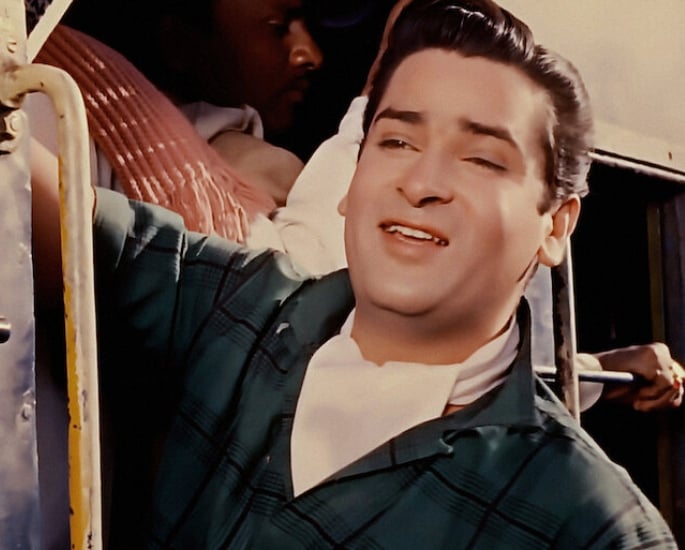 Director: Lekh Tandon
Director: Lekh Tandon
Stars: Shammi Kapoor, Kalpana Mohan, Lalita Pawar
In Lekh Tandon’s classic, Shammi Sahab inhabits the world of Professor Pritam Khanna.
To care for his ailing mother, Pritam disguises himself as an older man to get a job as a tutor for two women.
All hell breaks loose as feelings emerge from all three people involved.
It is now up to Pritam to romance the women at the same time in different disguises.
Shammi Sahab delivers a masterful performance as the conflicted Pritam.
A writer on Memsaab Story highlights Shammi Sahab’s restraint in his acting:
“This film is truly a Shammi showcase. It’s one of his best films from an acting standpoint.”
“He is quite restrained throughout – although still irrepressibly irresistible and charming.”
This charm is what Shammi Sahab is known for, and he brings it to its highest degree in Professor.
In an interview, Shammi Sahab admits he was hurt when he wasn’t awarded for his performance.
However, what is undeniable is his grand spectacle of acting, which remains an inspiration.
China Town (1962)
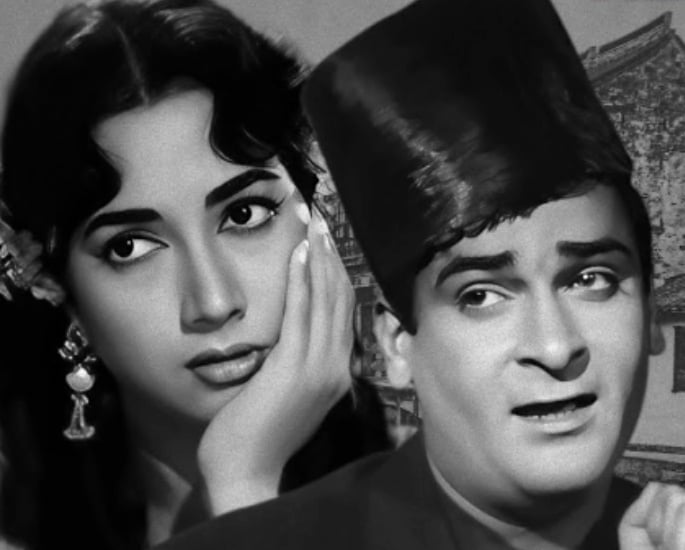 Director: Shakti Samanta
Director: Shakti Samanta
Stars: Shammi Kapoor, Shakila, Helen
In this romantic comedy, we get to enjoy Shammi Sahab in a double role.
China Town sees Shammi Sahab as Shekhar and Mike. Shekhar is in love with Rita Rai (Shakila).
However, her father does not approve of Shekhar, and the latter follows Rita to Kolkata.
When Shekhar gets arrested, his lookalike gangster, Mike, enters the scene.
As the worlds of the innocent singer and the criminal intertwine, one of Shammi Sahab’s finest performances unfolds.
Noting this performance, a writer on Blogspot says:
“Shammi Kapoor was a revelation, investing both his roles with more than enough differences – voice modulation, dialogue delivery, mannerisms, behaviour.
“The loutish behaviour of Mike versus the cheery, lovable Shekhar – one’s arrogance that set off the other’s diffidence.”
There are few industries other than Bollywood that gravitate to double roles in films as much.
In China Town, Shammi Sahab lives up to those expectations marvellously.
The result is there for all to see.
Bluff Master (1963)
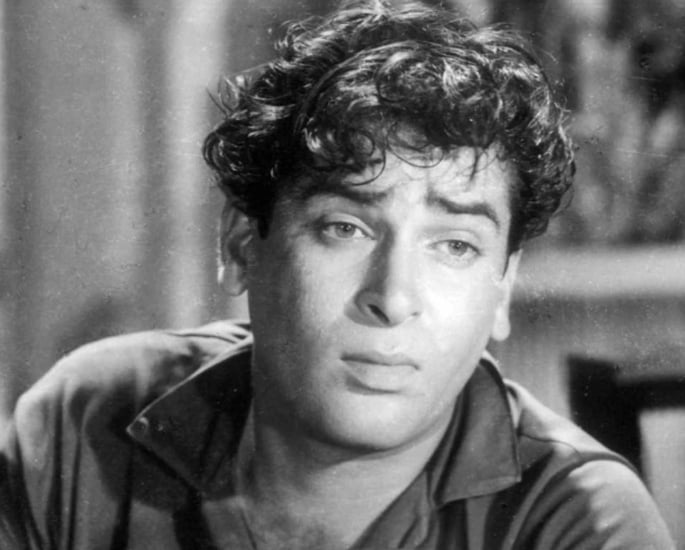 Director: Manmohan Desai
Director: Manmohan Desai
Stars: Shammi Kapoor, Saira Banu, Pran, Lalita Pawar
Shammi Sahab joins forces with the dynamic director Manmohan Desai to create one of his most enjoyable movies.
The actor portrays Ashok Azad, a jobless vagabond pretending to come from a rich family.
This habit of bluffing to impress Seema (Saira Banu) backfires when he finds that nobody believes him later in the film.
Will Ashok ever be able to win back trust and Seema’s affections?
Bluff Master is a captivating journey of decisions and mistakes.
Shammi Sahab and Saira refine their chemistry, and the result is a great film that stands the test of time.
In Bluff Master, the music by Kalyanji-Anandji is also a winner.
In a rare showcase, four playback singers give voice to Shammi Sahab in the same film.
These singers include Shamshad Begum, Mukesh, and Hemant Kumar.
However, the film’s most popular number, ‘Govinda Aala Re Aala‘, once again shows why Mohammad Rafi and Shammi Kapoor are an unbeatable pairing.
Watch Bluff Master for a fun and favourite viewing experience.
Kashmir Ki Kali (1964)
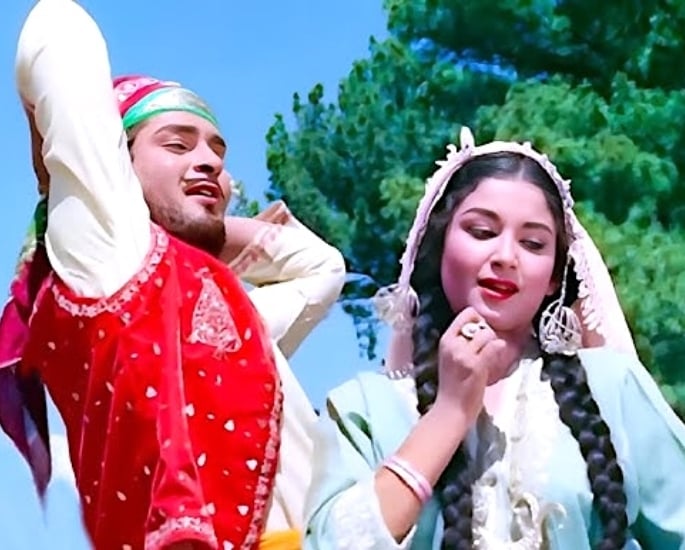 Director: Shakti Samanta
Director: Shakti Samanta
Stars: Shammi Kapoor, Sharmila Tagore, Pran, Nazir Hussain
The debut of acclaimed actress Sharmila Tagore, Kashmir Ki Kali is a canvas of opulence, colour, and scenery.
In Shakti Samanta’s work of art, Shammi Sahab plays Rajiv, who flees to Kashmir to avoid an arranged marriage.
The beautiful valleys introduce him to Champa (Sharmila), with whom he falls in love.
However, Rajiv must first fight off an unwelcome guest in the form of Mohan (Pran), a forest manager.
Kashmir Ki Kali transports viewers to alluring locations which complement Shammi Sahab’s persona beautifully.
Chartbusters such as ‘Yeh Chand Sa Roshan Chehra‘ and ‘Haye Re Haye’ are signature numbers which increase the charm of the film.
In an interview, Sharmila reflects on working with Shammi Sahab and the impact he created with Kashmir Ki Kali.
She says: “The film had terrific songs. I was nervous about dancing, and Shammi Ji was 200 times better than I was.
“I was just trying to keep up with him.
“In 1964, he was doing things like randomly breaking into dancing and showcasing spontaneous madness.
“That’s what actors like Shah Rukh Khan did much later.
“While today’s actors are so versatile and capable of emotionally invested performances, Shammi Ji was unique.”
Teesri Manzil (1966)
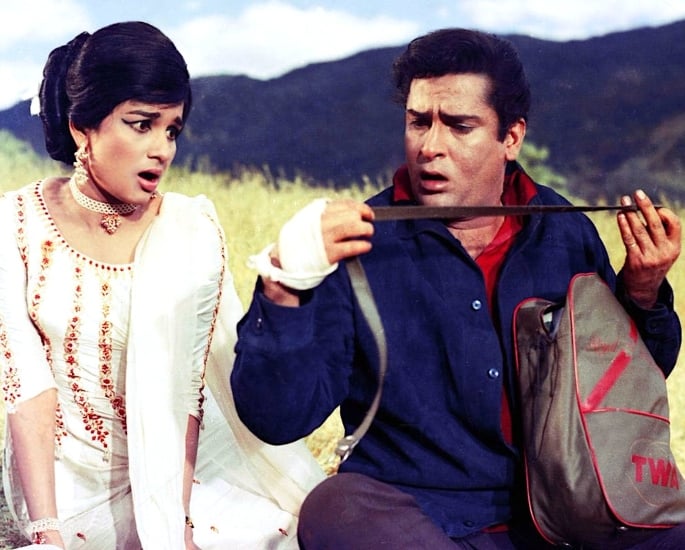 Director: Vijay Anand
Director: Vijay Anand
Stars: Shammi Kapoor, Asha Parekh, Helen, Prem Nath, Iftekhar, Prem Chopra
Under the production of Nasir Hussain, the blue-chip director Vijay Anand masterminds an original thriller filled with suspense and mystery.
In Teesri Manzil, Shammi Sahab transforms into the skilled drummer, Anil Kumar / Rocky.
He witnesses a young girl falling to her death from the third floor of a hotel.
This paves the way for one of the most exciting films in the history of Bollywood.
A romance also strikes between Anil and a glistening Sunita (Asha Parekh). Their chemistry is the backbone of the movie.
Shammi Sahab also sets a new benchmark for his dancing, swinging and swaying in the breezy ‘Aaja Aaja‘.
Teesri Manzil is also splendidly shot. An excellent example is a scene that is viewed entirely through a revolver.
Anupama Chopra describes the film as “a true meeting of style and substance”.
The film also marked the breakthrough of the music maestro, RD Burman, who ruled the Bollywood music scene in the 1970s and 1980s.
Meanwhile, the leading lady, Asha Parekh, praised Shammi Sahab’s sense of music:
“Shammi Kapoor was my first hero. I have learnt a lot from him.
“All the Kapoors have a good sense of music. There was so much music in his body that I didn’t find it difficult to follow him.”
An Evening In Paris (1967)
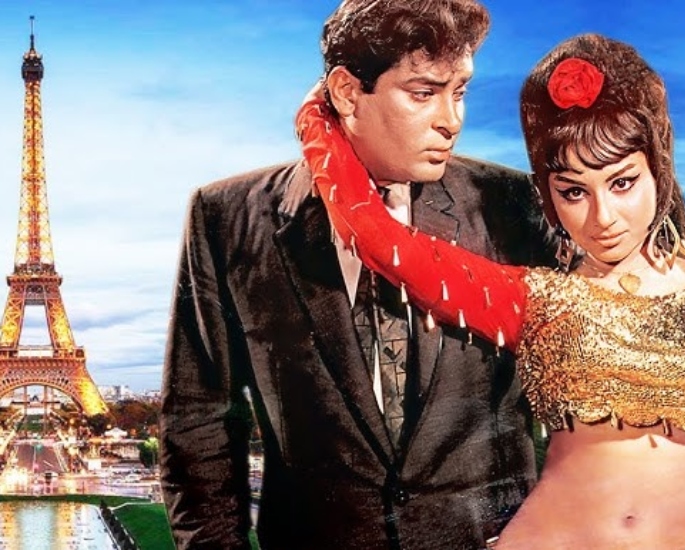 Director: Shakti Samanta
Director: Shakti Samanta
Stars: Shammi Kapoor, Sharmila Tagore
Shammi Kapoor reunites with Shakti Samanta and Sharmila Tagore for this picture.
An Evening In Paris is quintessential 1960s Bollywood. This was a decade that started with colour and abroad locations.
Viewers loved the idea of going to beautiful destinations for the price of a movie ticket.
In this film, Shammi Sahab is Shyam Kapoor, a lover boy who introduces Paris as the city of dreams and romance.
He falls in love with Deepa (Sharmila), and what follows is an iconic drama that is a treat for the eyes.
Interestingly, An Evening In Paris presented Sharmila in a swimsuit onscreen – something that was rare in the industry at the time.
The chartbuster, ‘Aasman Se Aaya Farishta‘ also depicts the vast openness of the sea along with Shammi Sahab dangling happily from a helicopter.
Sharmila also portrays Deepa’s doppelganger, Suzy, who is a vamp. Suzy also loves Shyam, but the latter’s heart only belongs to Deepa.
In 2025, the writer, Kirre Ranin, said: “It is just one of those films where you can turn your brain off and just enjoy the film for the light entertainment it is.”
An Evening In Paris shows that whether in the traditional fields of India or in the lush locations of Paris, Shammi Kapoor’s energy does not falter.
Brahmachari (1968)
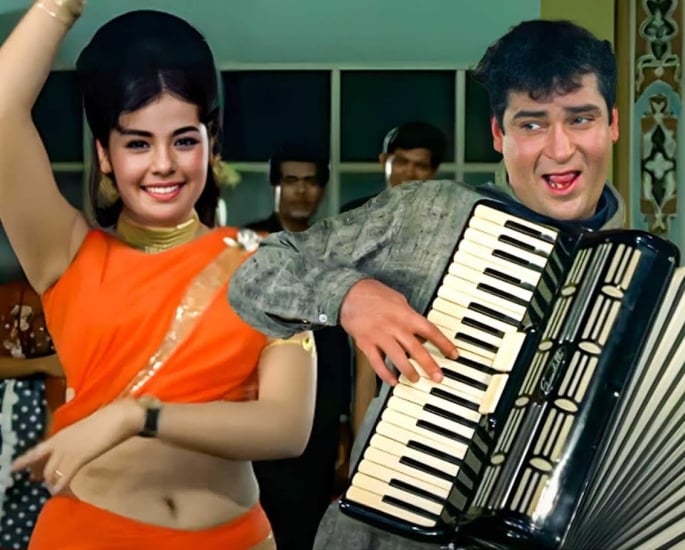 Director: Bhappi Sonie
Director: Bhappi Sonie
Stars: Shammi Kapoor, Rajshree, Pran, Mumtaz
Shammi Sahab brings the titular character of Brahmachari to life in this sterling film.
Brahmachari is an orphan who adopts other orphans into his house.
He promises to unite a depressed Sheetal Chaudhary (Rajshree) with the man she loves – a promiscuous Ravi Khanna (Pran).
When the pretty Roopa Sharma (Mumtaz) arrives, things get complicated and messy.
Brahmachari displays Shammi Sahab in yet another vibrant avatar, yet also showing his acting prowess.
His chemistry with Rajshree and Mumtaz is also praiseworthy, especially in Shankar-Jaikishan’s timeless songs.
For the film, Shammi Sahab won his first Filmfare ‘Best Actor’ award in 1969.
During the shooting of Brahmachari, Shammi Sahab and Mumtaz began a relationship. However, this soon came to an end.
Reminiscing about this, Shammi Sahab states: “Mumtaz was a very beautiful thing in that movie.
“At that time, I was a widower. For a little while, we both had dreams. Then, it turned into a nightmare.”
Regardless of the drama behind the scenes, Brahmachari remains a standout in Shammi Sahab’s career.
Prince (1969)
 Director: Lekh Tandon
Director: Lekh Tandon
Stars: Shammi Kapoor, Vyjayanthimala, Ajit, Rajendra Nath
Like Shammi Sahab’s real name, in Prince, he plays Prince Shamsher Singh / Sajjan Singh.
A spoilt brat, the prince is a womaniser who indulges in alcohol.
His life changes when a priest refuses to yield to his arrogance.
Shamsher later agrees to live life as an ordinary man, as Sajjan, the long-lost son of a blind woman.
When two corrupt police officers threaten to ruin his life, the prince must decide which identity he must honour.
Prince is a terrific film that finds an anchor in an elegant Vyjayanthimala (Princess Amrita).
The song, ‘Badan Pe Sitaare‘, is the anthem and is another addition to the rich repertoire of Shammi Kapoor and Mohammad Rafi classics.
This enchanting number was briefly used in Aishwarya Rai Bachchan’s film, Fanney Khan (2018).
Prince was one of the final films Shammi Sahab did as a leading man.
This change was down to Rajesh Khanna’s immense superstardom that swept the nation from the late 1960s.
Nevertheless, Shammi Sahab’s talent is very much intact in Prince.
Pagla Kahin Ka (1970)
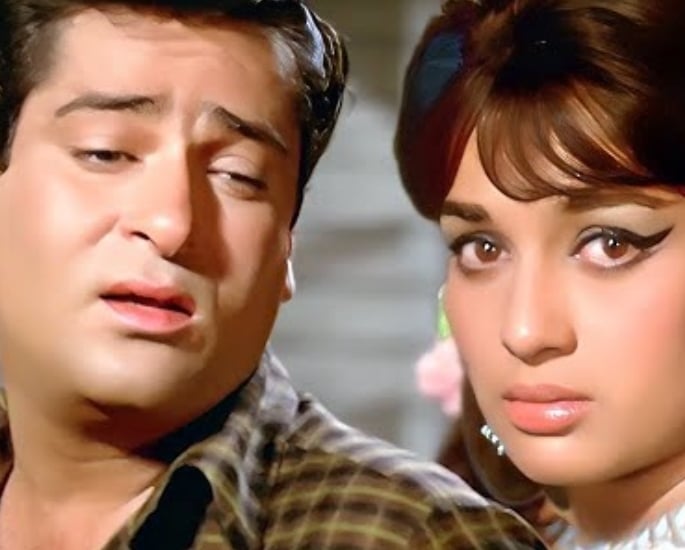 Director: Shakti Samanta
Director: Shakti Samanta
Stars: Shammi Kapoor, Asha Parekh, Helen, Prem Chopra
In his penultimate collaboration with Shakti Samanta, Shammi Sahab portrays Sujit – a man who has struggled with mental health all his life.
Things take a turn for the worse when Sujit and Jenny (Helen) plan to marry.
He later finds himself in a mental asylum, where a compassionate doctor, Shalini (Asha Parekh), changes his life.
Pagla Kahin Ka sheds light on mental health, love, and courage.
It also underscores the positive impact a doctor can have on their patients.
The film is also known for the haunting song, ‘Tum Mujhe Yun Bhula Na Paoge‘, which is pictured on Shammi Sahab and Asha.
While shooting for the film, Shammi Sahab heard that the ethereal actress, Madhubala, had died.
Before marrying Geeta Bali in 1955, Shammi Sahab had been in love with Madhubala.
Talking about this moment, Shammi Sahab recalled: “Both Shakti Samanta and I loved her, and we both cried when we heard the news.
“The last I heard from her was when Geeta died, when she had spoken to me on the phone.”
Pagla Kahin Ka is a special film, perhaps not only for Shammi Kapoor’s outstanding performance, but for more reasons than one.
Zameer (1975)
 Director: Ravi Chopra
Director: Ravi Chopra
Stars: Shammi Kapoor, Saira Banu, Amitabh Bachchan
In the mid-1970s, his days as a leading man over, Shammi Sahab successfully moved to character parts.
One of the first films he did in such a role was in Ravi Chopra’s Zameer as Thakur Maharaj Singh.
The proud owner of a farmhouse, Maharaj, fights some dacoits when they attack his land.
Years later, Maharaj and his family come across a young man whom they believe to be their missing son, Chimpoo Singh (Amitabh Bachchan).
However, this man is not really Thakur’s son and is actually named Badal Singh.
Will Thakur ever discover the truth, and will Badal’s conscience prick up?
Zameer is filled with dilemmas, deceit and dacoits. These were themes that were popular in the 1970s.
By this time, Amitabh was a superstar, riding high on the success of Zanjeer (1973), Deewaar (1975), and Sholay (1975).
However, Shammi Sahab stands out as a towering figure, commanding authority and respect in every frame.
For that, Zameer is one of his most iconic films.
Vidhaata (1982)
 Director: Subhash Ghai
Director: Subhash Ghai
Stars: Dilip Kumar, Shammi Kapoor, Sanjeev Kumar, Sanjay Dutt, Padmini Kolhapure
Continuing with Shammi Sahab’s iconic character roles, we come to Subhash Ghai’s epic film, Vidhaata.
In this film’s ensemble cast, Shammi Sahab plays Gurbaksh Singh, a friend of Shamsher Singh / Shobhraj (Dilip Kumar)
Admittedly, Shammi Sahab became aged by the late 1970s.
However, this doesn’t hinder the unforgettable impact he has on Vidhaata.
Shammi Sahab holds his ground against Dilip Kumar, while also giving younger actors, including Sanjay Dutt (Kunal Singh), their chance to shine.
Shammi Sahab proves that age is not an obstacle to his charisma, as shown in the dance number, ‘Saat Saheliyan Khadi Khadi‘.
By this time, Mohammad Rafi had sadly died. Nevertheless, with this song, Kishore Kumar turns out to be a brilliant voice for Shammi Sahab.
Shammi Sahab’s act as Gurbaksh is brash and bold. For this character, Shammi Sahab won the 1983 Filmfare ‘Best Supporting Actor’ award.
Paying tribute to Shammi Sahab, Subhash said: “He was a man of great love and affection with a tremendous passion for life.
“To me, Shammi Ji is a symbol of youth.”
Subhash’s words ring true in Vidhaata. This passion is what made the character of Gurbaksh a memorable figure.
Prem Rog (1982)
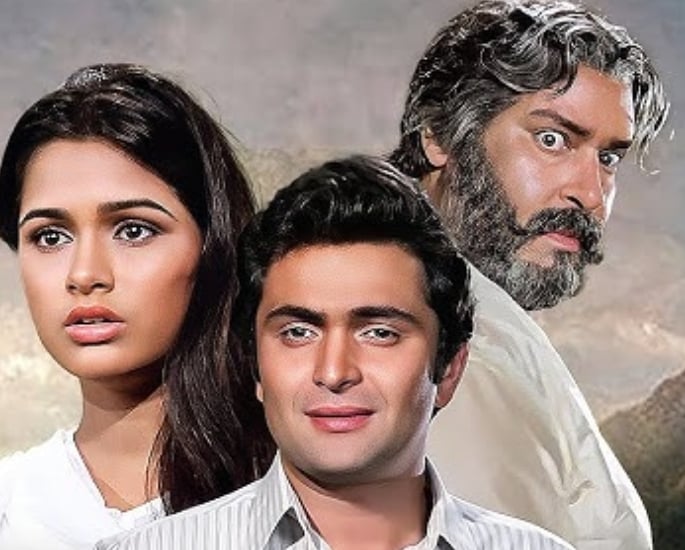 Director: Raj Kapoor
Director: Raj Kapoor
Stars: Rishi Kapoor, Padmini Kolhapure, Shammi Kapoor, Nanda, Tanuja
In this scintillating musical drama, Shammi Sahab is directed by his older brother, Raj Kapoor.
Prem Rog sees Shammi Sahab as Bade Raja Thakur, the uncle of Manorama ‘Rama’ Singh (Padmini Kolhapure).
As with his previous character roles, Shammi Sahab is a symbol of authority and respect.
Though he is not the main character in Prem Rog, he makes for a significant presence in the film.
Regarding Shammi’s casting in Prem Rog, Raj Kapoor explained:
“Shammi is very dear to me. But all those years, when he was a top star, I never had a subject for him.
“It was only when I needed that majestic, regal-looking Thakur in Prem Rog that I saw him as the ideal actor for the role.
“Shammi was of no use to me as the ‘Yahoo’ star.
“But in Prem Rog, the screen lights up every time he makes an appearance.”
Raj Sahab’s remarks represent the aura of Shammi Kapoor in Prem Rog.
Rockstar (2011)
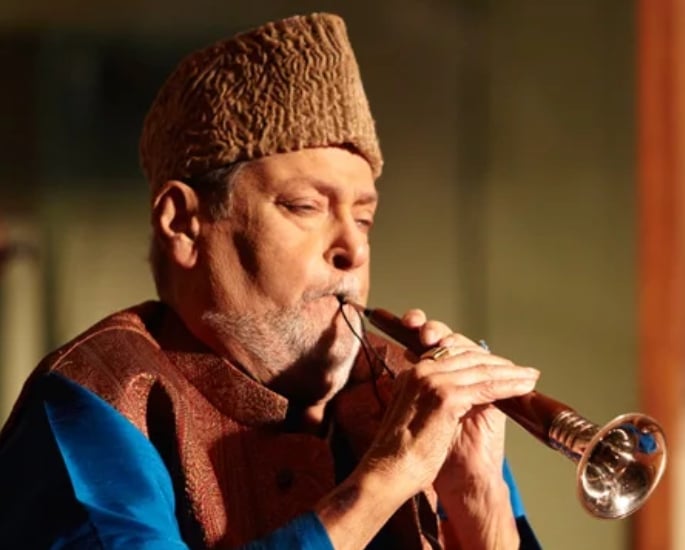 Director: Imtiaz Ali
Director: Imtiaz Ali
Stars: Ranbir Kapoor, Nargis Fakhri, Aditi Rao Hydari, Shammi Kapoor
5 Facts about Shammi Kapoor & His Films:
- He drank alcohol to cope with the height in 'Aasman Se Aaya Farishta'.
- During 'Zameer', he and Amitabh Bachchan created a melody which was used in 'Silsila'.
- Dev Anand was the original choice for 'Tumsa Nahin Dekha' and 'Teesri Manzil'.
- Shammi Kapoor suggested the crescendo in 'Yeh Chand Sa Roshan Chehra'.
- He never used a choreographer in his dance sequences.
In Shammi Kapoor’s final film appearance, he shares the screen with his grand-nephew, Ranbir Kapoor.
Imtiaz Ali’s Rockstar shows Shammi Sahab as Ustad Jameel Khan.
In his few scenes, Ustad makes an impression on Janardhan Jhakar ‘JJ’ / Jordan.
He teaches him about music and the shehnaai.
In a wheelchair and with a hoarse voice, Shammi Sahab defies all odds of health problems.
He reminds both old and new fans why he is such an iconic star.
In 2025, Imtiaz spoke about Shammi Sahab’s commitment despite his physical pain.
The director said: “I knew the kind of pain Shammi Ji was going through to come to set and perform each scene.
“It is his blessing that he was in the film and he gave it everything.
“I went and told him, ‘Shammi Ji, this is a very good take but there is pain on your face. I can go with this take’.
“He just looked down and said, ‘Okay, let’s do one more’.
“And then he just gave himself 30 seconds to take the pain out of his face, and then took the shot.”
Rockstar undoubtedly would not be the same without Shammi Sahab.
In his glimmering career, Shammi Kapoor has given Bollywood fans energetic performances, groovy dance moves, and memorable characters.
He is a shining symbol of rhythm and histrionics on celluloid.
Whether as the zestful performer or the authoritarian father figure, he eclipses the screen like no other.
He was termed as the ‘Elvis Presley of India’, but the truth is that Shammi Sahab’s identity only belongs to him.
Shammi Sahab passed away on August 14, 2011, but not before leaving a legacy of charisma and positivity.
So, go forth and embrace the dynamism and great acting of the one and only Shammi Kapoor.












